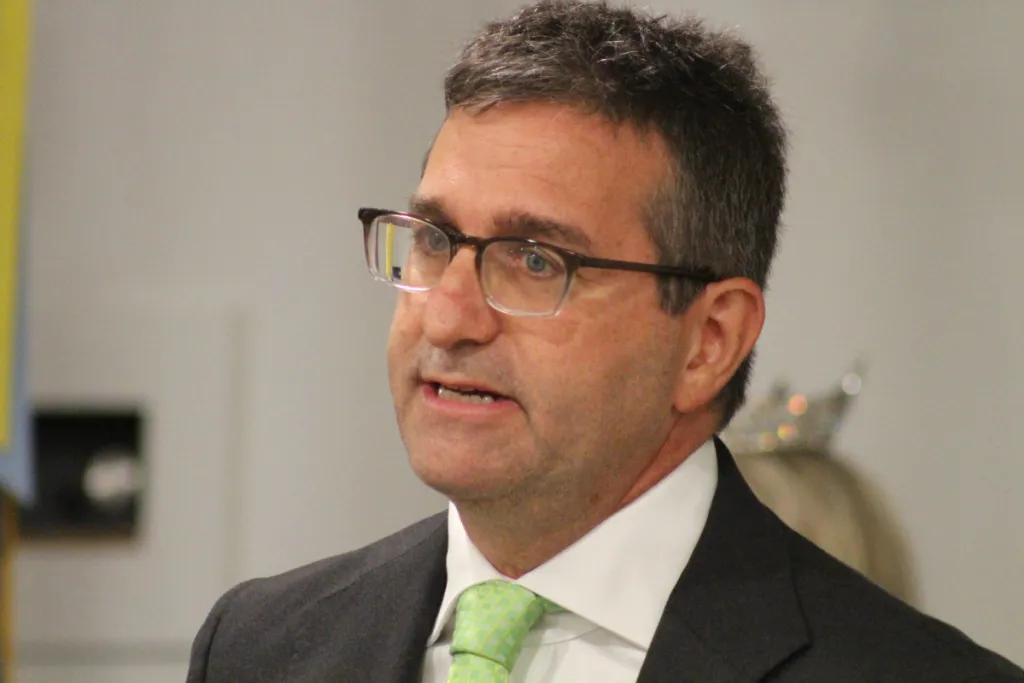
Why Should Delaware Care?
Thousands of Delawareans rely on SEPTA’s Wilmington/Newark train line to get to Philadelphia. Those riders’ commutes were at risk in recent months after the Pennsylvania agency placed the line on the chopping block amid a budget crisis. Despite the drama, Delaware’s governor said the state is sticking with SEPTA for the state’s rail transit needs.
After a summer of financial turmoil nearly derailed SEPTA’s Delaware operations, Gov. Matt Meyer’s office said the state will continue to rely upon the Pennsylvania agency for its transit service to Philadelphia.
In a statement to Spotlight Delaware on Monday, the governor’s office said state officials are not considering new transit options between Delaware and Philadelphia, beyond the SEPTA commuter trains that currently carry thousands of people daily.
“SEPTA continues to be the most economical option for Regional Rail service,” the governor’s office said in the statement.
SEPTA’s Delaware service operates under a 2002 agreement between the Pennsylvania agency and DART, Delaware’s public transit agency. DART’s payment for the service in recent years have amounted to over $10 million annually.
Meyer’s statement follows a SEPTA budget fight in the Pennsylvania legislature that until last month had Delaware’s train service on the chopping block.
It also follows calls in past years from Delaware transit advocates and from business commuters for more frequent buses or trains to Philadelphia.
In 2020, just before the COVID pandemic wreaked havoc on downtown office markets, the News Journal reported that Wilmington-area employers were examining alternative ways to bring Philadelphia workers to Delaware.
Among the options then was for business leaders to lobby Amtrak for new commuter rail trains, or to set up an express bus line – akin to the Google bus that operates in the San Francisco Bay Area.
Meyer had also considered launching an express bus service from Delaware to Philadelphia during SEPTA’s financial turmoil this past year.
The governor’s office said there are no longer plans for express buses “at this time.”
No long-term solution in sight
In April, SEPTA proposed cutting nearly half of its service, including its Wilmington/Newark train line, because of a $213 million budget deficit that, it said, emerged as inflation increased and COVID-era dollars dried up.
The proposal sparked an outcry across the mid-Atlantic region that included Meyer’s office lobbying his counterpart in Pennsylvania – Gov. Josh Shapiro.

At the time, Meyer’s office said it was reviewing “everything we can do here” to continue service in Delaware.
By late June, SEPTA approved its new budget that included what it called the “devastating service cuts.” As part of the cuts, it initially reduced service to the Delaware commuter rail line and planned to terminate it on Jan. 1, 2026.
Then, last month, Shapiro’s administration reversed the service cuts by authorizing SEPTA to dip into its capital dollars — which it uses for new vehicles and infrastructure — to pay the costs of operating buses and trains.
In announcing the decision, Pennsylvania Transportation Secretary Mike Carroll said in a letter to SEPTA those funds had not yet been assigned to specific projects. The letter came shortly after a Pennsylvania judge ordered SEPTA to restore full service to its routes.
Now, SEPTA says it can avoid service cuts for two years with the new dollars it pulled from its capital budget.
“We solved the immediate need, but we exasperated the future need,” SEPTA General Manager Scott Sauer said in a press release.
A 21.5% fare increase that SEPTA implemented systemwide over the summer remains in effect.
In his letter, Carroll also blamed the Pennsylvania Senate Republicans for failing to approve more funding for transit.
But Pennsylvania State Senate Majority Leader Joe Pittman said in a statement to Spotlight PA last month that the service cut was a “manufactured crisis,” and insisted the agency needs to implement safety and accountability reforms.
As of Oct. 7, Pennsylvania lawmakers still have not passed their state budget. It was due on June 30.
Asked what lessons Delaware learned following the drama in Pennsylvania, Meyer’s office in a subsequent emailed statement, argued that investments in transit benefit society broadly.
The statement also pointed to a recent executive order from Meyer to launch a task force to study what the governor called “sustainable funding for transportation needs, including transit.”





